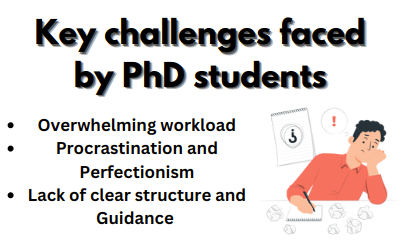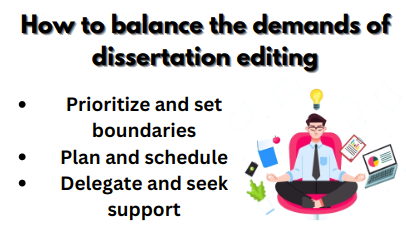Dissertation editing is a critical phase in the journey of PhD students, requiring meticulous attention to detail and adherence to deadlines. This comprehensive guide aims to equip PhD students with invaluable strategies and insights to effectively manage time and deadlines during the dissertation editing process. From planning and goal setting to organizing the editing process and utilizing efficient tools, this guide offers practical tips and expert advice to optimize productivity and produce a refined and polished dissertation. Whether starting the editing process or seeking to enhance existing time management skills, this guide will serve as a valuable resource, for navigating the realm of time and deadline management in dissertation editing for PhD students.
Key challenges faced by PhD students

1. Overwhelming workload: The dissertation editing process involves reviewing and revising a substantial amount of written material. PhD students may find it challenging to balance this workload with their other academic responsibilities, such as coursework, teaching assignments, or research work.
2. Procrastination and perfectionism: PhD students may struggle with procrastination, especially when faced with the daunting task of editing their dissertation. They might also be perfectionistic and spend excessive time on individual sections or chapters, striving for perfection. This can lead to delays and difficulties in meeting deadlines.
3. Lack of clear structure and guidance: Editing a dissertation requires a systematic approach, but some students may struggle to establish a clear structure for the editing process. Without proper guidance or a well-defined plan, they may feel overwhelmed and struggle to allocate their time effectively.
Importance of planning and goal-setting techniques
1. Create a detailed timeline: Break down the editing process into smaller tasks and create a timeline with specific deadlines for each task. This will provide a clear roadmap and help you stay organized throughout the process.
2. Prioritize tasks: Identify the most critical tasks that need to be addressed first, such as major revisions or addressing feedback from your advisor. Prioritize these tasks to ensure you allocate sufficient time and attention to them.
3. Set SMART goals: SMART goals are Specific, Measurable, Achievable, Relevant, and Time-bound. Define clear and specific goals for each editing task. For example, setting a goal to edit a specific chapter by a certain date or to revise a specific section within a given timeframe. This helps create focus and accountability.
Strategies and techniques
1. Assess task urgency and importance: Evaluate the deadlines and determine which tasks are most urgent and important. Focus on the tasks that have closer deadlines or require immediate attention. This helps you prioritize your efforts and allocate time accordingly.
2. Use a task management system: Utilize a task management system, such as a to-do list or project management software, to keep track of all the editing tasks and deadlines. Break down the tasks into smaller actionable items and assign specific deadlines to each. This provides a visual overview of your workload and helps you stay organized.
3. Apply the Eisenhower Matrix: The Eisenhower Matrix categorizes tasks into four quadrants based on their urgency and importance. Prioritize tasks as follows:
- Urgent and important: These tasks should be addressed first.
- Important but not urgent: Schedule specific time slots to work on these tasks to prevent them from becoming urgent later.
- Urgent but not important: Consider delegating or finding alternative solutions for these tasks if possible.
- Not urgent and not important: These tasks can be deprioritized or eliminated.
Impact of different organizational and time management tools on the efficiency of time and deadline management
1. Centralized task management: Project management software or task tracking apps provide a centralized platform to manage and track all editing tasks and deadlines. You can create a comprehensive list of tasks, assign deadlines, and monitor progress in one place. This helps prevent tasks from falling through the cracks and ensures better organization.
2. Visibility and transparency: These tools offer visibility into the status of each task and deadline. You can see which tasks are pending, in progress, or completed, enabling you to have a clear overview of your workload and identify any potential bottlenecks. This transparency helps you stay accountable and manage your time effectively.
3. Collaboration and communication: Many project management software tools facilitate collaboration among team members or with your advisor. You can share documents, exchange comments, and receive feedback within the tool itself. This streamlines communication and ensures that everyone involved is on the same page, reducing the time spent on back-and-forth exchanges.
Psychological factors influencing PhD students' ability to manage time and meet editing deadlines and the factors addressed to enhance productivity
1. Procrastination: Procrastination is a common challenge for many PhD students. It can stem from fear of failure, perfectionism, or feeling overwhelmed. To address procrastination, break down tasks into smaller, manageable chunks, set specific deadlines for each task, and use techniques like the Pomodoro Technique to work in focused intervals. Additionally, identify and challenge negative thoughts or beliefs that contribute to procrastination.
2. Perfectionism: Striving for perfection can lead to excessive time spent on editing and revisions. Recognize that perfection is rarely attainable and focus on achieving a high-quality outcome instead. Set realistic expectations, set clear boundaries for editing time, and seek feedback from advisors or peers to gain perspective on when to move forward.
3. Time management skills: Poor time management skills can lead to difficulties in meeting editing deadlines. Develop effective time management techniques, such as creating schedules, prioritizing tasks, and avoiding multitasking. Use tools like calendars, to-do lists, or time-tracking apps to stay organized and allocate time efficiently.
Importance of effective communication with supervisors, committee members, and other stakeholders and their contribution
1. Clarifying expectations: Regular communication helps in understanding the expectations and requirements of supervisors and committee members regarding the editing process. By discussing timelines, deadlines, and the scope of revisions, you can ensure that you are on the same page and have a clear understanding of what needs to be accomplished within a given timeframe.
2. Receiving timely feedback: Effective communication allows you to receive timely feedback on your edited work. This feedback is crucial for making necessary revisions and improvements. Regular discussions and meetings with your supervisors and committee members provide opportunities to address questions, seek clarification, and gain insights that can help you refine your work and stay on track.
3. Managing changes and revisions: During the editing process, there may be instances where changes or additional revisions are requested by your supervisors or committee members. Effective communication ensures that you are promptly informed about these changes and can allocate time and resources accordingly. It helps you adapt your timeline and prioritize tasks to accommodate the revisions without compromising other deadlines.
Role of self-discipline and motivation
1. Set clear goals: Clearly define your editing goals and the corresponding deadlines. Establishing specific, measurable, achievable, relevant, and time-bound (SMART) goals provides clarity and a sense of purpose. Write down your goals and keep them visible as a reminder of what you're working towards.
2. Break down tasks: Break down the editing process into smaller, manageable tasks. This keeps you from feeling overloaded and enables you to concentrate on one task at a time. Create a detailed to-do list or task board and track your progress as you complete each task. Celebrate small milestones to stay motivated.
3. Establish a routine: Develop a consistent editing routine that aligns with your natural productivity patterns. Determine your most productive time of day and dedicate that time to your editing tasks. Create a structured schedule, allocating specific time slots for editing, breaks, and other commitments. Stick to this routine as much as possible to develop discipline and habit.
Potential consequences of poor time and deadline management
1. Reduced quality of work: When time and deadlines are poorly managed, there may be limited time for thorough editing and revision. This can result in a lower quality of the final dissertation. Important errors, inconsistencies, or gaps in the research may go unnoticed, leading to a less comprehensive and polished piece of work.
2. Missed opportunities for improvement: Inadequate time management can result in missed opportunities to incorporate feedback and suggestions from advisors, committee members, or peers. This feedback is valuable for enhancing the research and ensuring its alignment with academic standards. Missing these opportunities may limit the potential for growth and improvement in the dissertation.
3. Increased stress and burnout: Poor time and deadline management often lead to increased stress levels and higher chances of experiencing burnout. Constantly rushing to meet deadlines, working long hours, and feeling overwhelmed can negatively impact mental and physical well-being. This can hinder concentration, creativity, and overall productivity.
Balancing the demands of dissertation editing

1. Prioritize and set boundaries: Identify your priorities and set clear boundaries. Determine which commitments are most important and allocate time accordingly. Learn to say no to additional tasks or commitments that may overload your schedule. Setting boundaries helps you protect your time and energy for essential activities.
2. Plan and schedule: Create a structured schedule that includes dedicated time for dissertation editing, academic commitments, personal activities, and rest. Use a planner, calendar, or digital tools to schedule and track your activities. Be realistic about what you can accomplish within a given timeframe and ensure you have time for self-care and relaxation.
3. Delegate and seek support: Recognize that you don't have to do everything on your own. Delegate tasks or seek support from peers, friends, or family members. For example, you can collaborate with colleagues on research projects, seek assistance with administrative tasks, or ask for help with household responsibilities. Utilize available resources and support systems to lighten your load.
Long-term benefits of developing effective time and deadline management skills
1. Increased productivity: Effective time and deadline management skills enable you to work efficiently, accomplish tasks in a timely manner, and avoid unnecessary delays. This enhanced productivity translates into future research and career endeavours, where you can tackle projects more efficiently, and meet deadlines, and produce high-quality work.
2. Improved research output: By managing your time effectively during the dissertation editing process, you can produce a well-polished and thoroughly revised a dissertation Topic. This sets a strong foundation for future research endeavours. The ability to meet deadlines and pay attention to detail improves the quality of your research output and contributes to your credibility as a researcher.
3. Enhanced reputation and credibility: Developing strong time and deadline management skills demonstrates your professionalism, reliability, and commitment to your work. These qualities contribute to building a positive reputation and enhancing your credibility in the academic and professional community. Colleagues, advisors, and potential employers value individuals who can manage their time effectively and consistently meet deadlines.
In conclusion, effective time and deadline management in dissertation editing is crucial for the success of PhD students. By implementing strategies such as prioritization, goal setting, effective communication, and the use of organizational tools, students can optimize their time and meet editing deadlines with confidence. Through effective time and deadline management, students can enhance the quality of their research, maintain a healthy work-life balance, and reduce stress. Furthermore, the development of these skills during the dissertation editing process offers long-term benefits, including increased productivity, improved research output, enhanced reputation, reduced stress, and the acquisition of transferable skills. By mastering the art of time and deadline management in dissertation editing, PhD students can position themselves for future research and career endeavours with confidence and success.